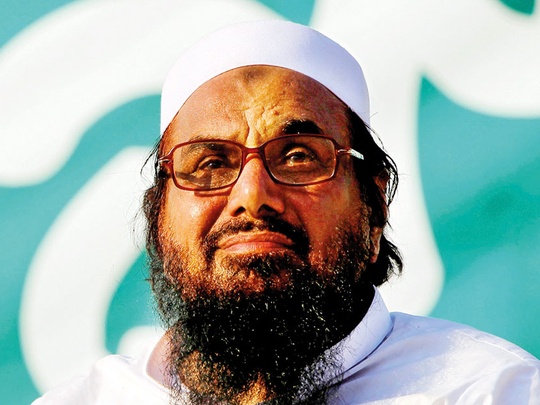
Islamabad
Pakistan’s federal cabinet has approved new rules to go tough on banned outfits in the country and block their financial assistances.
The approval of the much-discussed ‘Anti-Terrorism (Freezing and Seizure) Rules 2018’ was granted on Tuesday in a meeting presided over by Prime Minister Shahid Khaqan Abbasi at the PM’s Office. The move will allow Pakistan to block funding of terror outfits, freeze their accounts and take action against them.
On Wednesday, the federal government issued a notification directing the concerned authorities to freeze the movable and immovable assets of Jamaat-ud-Dawa (JuD) and its charity arm Falah-e-Insaniyat Foundation (FIF) under Anti-terrorism (Amendment) Ordinance, 2018.
Following the orders, the Punjab government took action against JuD and FIF seminaries and health facilities in Rawalpindi, Geo News reported.
Pakistan government had earlier banned individuals and companies from making donations to the JuD, the FIF and other organisations.
The decision to tighten the noose around banned outfits was followed by an ordinance promulgated by President Mamnoon Hussain earlier this week that amended the Anti-Terrorism Act, 1997 to proscribe the outfits banned by the United Nations Security Council (UNSC) Act 1948.
The measure primarily aims at taking on terrorist outfits, the sectarian organisations in particular, which have already been listed as banned by the Ministry of Interior and the National Counter Terrorism Authority (NACTA).
With the latest amendment, the authorities concerned will be able to take action against the UNSC-banned individuals and terror outfits under the framework of the Financial Action Task Force (FATF) — an international body that combats money laundering and terrorist financing.
The UNSC sanctions list includes Al Qaida, Tehreek-e-Taliban Pakistan (TTP), Lashkar-e-Jhangvi, Jamaat-ud-Dawa (JuD), Falah-e-Insaniat Foundation (FIF), Lashkar-e-Taiba and others.
Pakistan’s Interior Ministry has placed a ban on terrorist outfit Jundullah, a splinter group of TTP while Lashkar-e-Tayyiba was declared as banned organisation under the UNSC resolution 1267 in 2005.
Earlier, the United States put forward a motion to place Pakistan on a global terrorist-financing watch-list with an anti-money laundering monitoring group.
US President Donald Trump’s administration suspended aid worth about $2 billion (Dh7.35 million) and threatened to cut off billions of dollars of aid to Pakistan over its alleged ties with militants.
Pakistan, however, denies assisting militants in Afghanistan and India, and has reacted angrily to US threats. “Pakistan’s cooperation [in the war against terror] is not based on any consideration of aid but on our national interests and principles,” Pakistan’s Ambassador to the United Nations Maleeha Lodhi earlier said, adding “We have contributed and sacrificed the most in fighting international terrorism.”
On Tuesday, the United States put forward a motion to place Pakistan on a global terrorist-financing watchlist with an anti-money laundering monitoring group, according to a senior Pakistani official.
Pakistan has been scrambling in recent months to avert being added to a list of countries deemed non-compliant with terrorist financing regulations by the Financial Action Task Force (FATF), a measure officials fear could hurt its economy.
A meeting of FATF member states is due to take place next week in Paris, where the organisation could adopt the motion on Pakistan.
Pakistan’s de facto finance minister, Miftah Esmail, told Reuters the United States and Britain put forward the motion several weeks ago, and later persuaded France and Germany to co-sponsor it.
“We are now working with the US, UK, Germany and France for the nomination to be withdrawn,” Esmail said, speaking by telephone from Europe. “We are also quite hopeful that even if the US did not withdraw the nomination that we will prevail and not be put on the watchlist.” Pakistan was previously on the FATF watchlist from 2012 to 2015.
A senior US official who follows US policy in the region said Pakistan has “always been selective” in cracking down on militants who use its territory as a base.
“It is time for that to stop, and so we are working with our allies, who also are affected, to see effective action against groups such as the Haqqanis and elements of the Taliban,” said the official, referring to militants operating along the border with Afghanistan.
The FATF, an intergovernmental body based in Paris that sets global standards for fighting illicit finance, had previously warned Islamabad it could be put back on the list without further efforts to crack down on the flow of funds to militants.
Pakistani officials and Western diplomats say being put on the FATF watchlist could deal a blow to Pakistan’s economy as it would make it harder for foreign investors and companies to do business in the nuclear-armed South Asian nation.
“If you’re put on a terror watchlist, you’re made to go through all the (extra) scrutiny,” Pakistan’s former counterterrorism chief, Khawaja Khalid Farooq, told Reuters. “It can hurt the economy very badly.”












